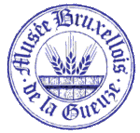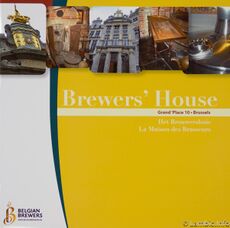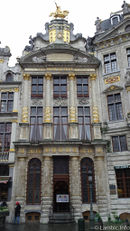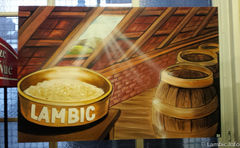Museums
Throughout the years, many museums have opened, capturing the history and culture of lambic. These museums have a wide variety of hours, some being open only a few days a year, while others are located inside of breweries. The lambic visitor center is even visited along many of the bus routes during the Toer de Geuze. Visiting these locations can provide additional insight into current and closed breweries, brewing processes, the history of equipment, farmhouse brewing, and the family businesses which have survived through generations.
The following museums identified below have specific lambic focused areas. If you have photos or additional information from any of these that you would like to provide to the lambic.info initiative, please contact Matthew through the Submissions page.
Brussels Gueuze Museum

Main Page: Brussels Gueuze Museum
Website: https://www.cantillon.be/musee
Address: 56 rue Gheude, B-1070 Brussels
Opened in 1978 by Jean-Pierre Van Roy, the Brussels Gueuze Museum (French: Musée bruxellois de la Gueuze, Dutch: Brussels Museum van de Geuze is housed within Cantillon. This 'living museum' allows visitors to tour the brewery, viewing current and vintage brewing equipment, historical documents, and traditional lambic beers. The tour is self guided, with guide books available in French, Dutch, or English.
Lambic Visitor Center ("De Lambiek")
Main Page: Lambic Visitor Center (Bezoekerscentrum "De Lambiek")
Website: http://www.delambiek.be/
Address: Gemeenveldstraat 1, 1652 Alsemberg
De Lambiek provides a comprehensive history of lambic brewing, as well as information about brewing processes, spontaneous fermentation, and lambic culture. The museum includes a 15 minute video, available in four languages, that further educates the visitor. Historic lambic brewerania is also on display throughout the museum.
Museum of Belgian Brewers


Website: http://www.belgianbrewers.be/en/who-are-we/museum-54/article/the-museum-of-the-belgian-brewers
Address: Grand Place 10, 1000 Brussels
The Museum of Belgian Brewers is located within the Grand Place in Brussels. It includes a full brewing setup for an 18th century Belgian brewery. From there, it moves forward in time, discussing current brewing techniques and the science behind modern brewing.
Museum of Belgian Beers
Website: http://www.museebieresbelges.centerall.com/
Address: Rue de la gare 19, 5170 Lustin
The Museum of Belgian Beers contains a massive collection of over 20,000 beers and 20,000 glasses, as well as housing a wide variety of other memorabilia. Many of the bottles and glasses in this collection cannot be found anywhere else.
Oud Beersel Museum
Website: http://www.degeuzenvanoudbeersel.be
Address: Laarheidestraat 230, 1650 Beersel
The Oud Beersel Museum includes the old brewery installation, vintage barrel cleaning and other brewing equipment, old style brewing techniques and brewerania including publicity, glassware, stoempers, baskets, tire-bouchon. etc.
Schaerbeek Museum of Beer

Main Page: Schaerbeek Museum of Beer
Website: http://users.skynet.be/museedelabiere/htmluk/menu.html
Address: Avenue Louis Bertrand 33-35, 1030 Schaerbeek
The museum offers a collection of over 1,000 bottles, a large number of which are accompanied by their companion glass. They also have a collection of old brewing machines, coopers' tools, pub and beer signs, various publicity materials, and old documents from both existing and defunct breweries. [1]
Timmermans Brewery Museum
Website: http://anthonymartin.be/en/timmermans-brewery/visits/
Address: Kerkstraat 11, 1701 Dilbeek
While the Timmermans Brewery gives tours by appointment, they also have a museum at the brewery. As Timmermans has been brewing at that location since 1702, they have gathered a significant collection of historical artifacts related to lambic. Much of the brewing equipment still in use today also dates back 50+ years. The tours are guided and include tastings at the end.